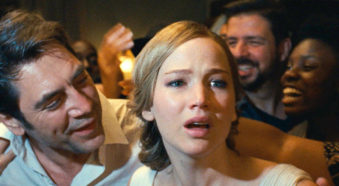The great writer and critic Harlan Ellison once wrote “You are not entitled to your opinion. You are entitled to your informed opinion. No one is entitled to be ignorant.” It is a quote that came charging to mind as I read Kyle Smith’s entirely wrong-headed review of Darren Aronofsky’s latest film mother!, which opened this weekend, in the National Review.
(Note: There will be spoilers discussed here, especially for the film’s third act tour-de-force. Proceed at your own risk.)
Mother! The Allegory
First off, it should be noted that mother!, is not really the film that is being marketed. I am not sure who is at fault here, but it is most definitely not a home invasion thriller in the strictest sense nor a riff on Rosemary’s Baby that many people seem to be under the impression that it is. Aronofsky’s film is an allegorical retelling of the Bible, but one that still allows itself to multiple interpretations. Funnily enough, just like most sacred scriptures.
The film opens on a married couple living alone in an isolated home. The wife, Jennifer Lawrence named as Mother in the film’s closing credits, is working to restore after it had been damaged by some sort of fire, while the husband, Javier Bardem credited as just Him, is a writer struggling to complete his latest work. Their peaceful tranquility is broken by the arrival of a stranger (Ed Harris), closely followed by his wife (Michelle Pfeiffer). When their two sons (Brian Gleeson and Domhnall Gleeson) in turn arrive on their doorstep, with one killing the other in a fit of anger, it becomes clear that Aronofsky is retelling the Bible in broad allegorical strokes. Him is God, Mother is Mother Nature, a personification of Creation. The couple are Adam and Eve and their children and Cain and Abel. The breaking of a sink that sprays water across the kitchen forces the end of an impromptu, late night wake for the murdered son is the Great Flood. It is all fairly straightforward and easy to decode once you see what Aronofsky is doing.
Where things get more difficult is the final act of the film. Ostensibly, it starts off as a retelling of the New Testament, with Mother giving birth to a baby which Him presents to the throngs of fans who are now filling the house. But then things get dark. There is a very graphic literalization of the Catholic sacrament of Communion, which also can be read as the fragmentation of Christianity into its many sects. And then the house erupts in chaos and violence. While Him continues to show love and forgiveness to all, Mother can only see the destruction that they are causing. Finally she has enough and goes to the basement and ignites a fireball killing all except Him. Dying from her burns, Mother asks for forgiveness which is granted. After she dies in Him’s arms, we see that this is a cycle and the house will be rebuilt by a new Mother. Him will continue to create and maybe this next time it won’t go wrong.
Side note – This ending with its suggestion of a cyclical nature to the tale echoes Bing Crosby’s moving on to another parish at the end of Going My Way (1944), a film Smith laments as the high point from which mother!‘s studio Paramount Pictures has fallen from to their current depths with the release of this film. Apparently, he missed the studio’s disastrous attempt at counter-cultural hipness, Skidoo, which coincidentally had Groucho Marx playing a character called God.
“Vile And Contemptible”
 In his screed, Mr. Smith calls the film “[d]eliberately grotesque and nauseating,” “vile and contemptible” and “seemingly engineered to outrage Christians.” And that is all certainly some juicy red meat to throw out to the conservative National Review readership. But after seeing the movie, I really don’t have any idea as to what he is talking about. But that’s OK, as I don’t think he does either.
In his screed, Mr. Smith calls the film “[d]eliberately grotesque and nauseating,” “vile and contemptible” and “seemingly engineered to outrage Christians.” And that is all certainly some juicy red meat to throw out to the conservative National Review readership. But after seeing the movie, I really don’t have any idea as to what he is talking about. But that’s OK, as I don’t think he does either.
The problem with Smith’s review is that it is not really a review at all. At no point does he seem to want to engage with the text of the movie or with what Aronofsky is trying to say through the film in any manner whatsoever. He gives a half-hearted summation of things that happen in its first two-thirds, but slags off the third act as “a Sunday-school lesson in the form of a midnight movie from the schlockmeisters at Troma Entertainment.” It is not a critique so much as it as an ad hominem attack. And it is possible to be critical of the film without needing to resort to such mud slinging. David Edelstein of Vulture gave it a thumbs down, calling it “grandiose and self-aggrandizing.” However, Edelstein at least manages to support his position on the film with examples that he discusses. Smith does not.
(I will point out that the negative reviews from conservative outlets that I’ve read all have gone to pains to mention that Aronofsky and the film’s star Jennifer Lawrence are in a relationship as if that means… something.)
Additionally, Smith takes a sideways slam at Aronofsky over the director’s 2014 film Noah for not being “particularly well versed” in the Bible. It’s a cheap shot that ignores the fact that many elements of that film might not be found in the King James edition of Genesis come from other, Apocryphal religious storytelling traditions. Aronofsky didn’t get the story wrong, he just went beyond the slim traditional narrative available to him. (Peter Jackson got similar criticism for adding extra-textual story elements written by Tolkien but not actually appearing in the author’s original text for The Hobbit.) Maybe it is Smith who needs to brush up on his Bible history.
It strikes me as ridiculous to attack Aronofsky’s bonafides on religion, as it features thematically in both the director’s debut feature Pi (1998) and in The Fountain (2006). But that just might be the case. Smith isn’t mad that Aronofsky doesn’t know his religion, he is upset that Aronofsky isn’t catering strictly to his own religious tradition. Perhaps it is something inherent in how some people live their faith. Faith is a person’s personal truth, and no matter how much they want it to be, it is not empirical truth. That’s implied in the definition. And when you present something that could fly in the face of that faith, it is often presented not as an alternate belief or point of view but an attack.
“Biblically-Infused Version Of Torture Porn”
And that seems to be the sin committed by Aronofsky, at least in Smith’s eyes. Aronofsky was not catering directly to Smith’s own belief structure in the film, so therefore he was attacking it. And just for fun he throws in a preemptive attack on any critic who would dare to find merit in the film. As someone raised Catholic, I found the film interesting and challenging. And it carries a strong pro-environmentalist theme that appeals to the Church teachings of my youth that stated we are caretakers of Creation. Mother’s destruction of the house/world via an explosion of a tank of heating oil is certainly a stand-in for climate change and how our mistreatment of the environment can led to our own demise.
But the film also ends not on a dismal note, but on one of hope. A new Mother arises literally from the ashes of the old. An egg-like crystal, although a secular symbol, suggests the rebirth and promise of Easter. And perhaps the next version of humanity will do better than we did. That Smith can’t see the beautiful, hopeful and optimistic note that the film ends on, but can only see what he calls “Biblically-infused version of torture porn,” is entirely his own problem and not Aronofsky’s or the film’s.
If anything, there is a reading of the film where it could be interpreted as a critique not of religion, but of the religious and how they clamor for the attention of God all the while never attempting to just live by His Word. Witness the way that war breaks out in the house in the film’s intense third act. We see Him’s publisher – And yes, that is Kristin Wigg – remorselessly executing prisoners by shooting them in the head. Maybe that struck chord with Smith. If so, it is a pity that it didn’t trigger some introspection instead of the solipsistic lashing out we got.



